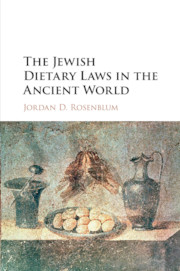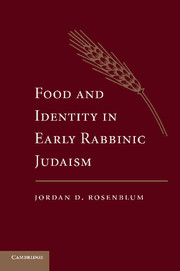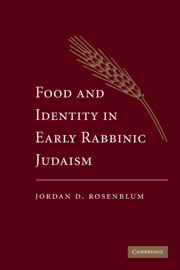The Jewish Dietary Laws in the Ancient World
- Author: Jordan D. Rosenblum, University of Wisconsin, Madison
- Date Published: March 2019
- availability: Available
- format: Paperback
- isbn: 9781107462281
Paperback
Other available formats:
Hardback, eBook
Looking for an inspection copy?
This title is not currently available on inspection
-
In The Jewish Dietary Laws in the Ancient World Jordan D. Rosenblum explores how cultures critique and defend their religious food practices. In particular he focuses on how ancient Jews defended the kosher laws, or kashrut, and how ancient Greeks, Romans, and early Christians critiqued these practices. As the kosher laws are first encountered in the Hebrew Bible, this study is rooted in ancient biblical interpretation. It explores how commentators in antiquity understood, applied, altered, innovated upon, and contemporized biblical dietary regulations. He shows that these differing interpretations do not exist within a vacuum; rather, they are informed by a variety of motives, including theological, moral, political, social, and financial considerations. In analyzing these ancient conversations about culture and cuisine, he dissects three rhetorical strategies deployed when justifying various interpretations of ancient Jewish dietary regulations: reason, revelation, and allegory. Finally, Rosenblum reflects upon wider, contemporary debates about food ethics.
Read more- The first book to collect and analyze ancient discussions of biblical dietary laws
- Challenges the traditional view that the Hebrew Bible provides justification for its food laws
- Builds a model for understanding ancient debates about food ethics and the broader study of cultural and religious justifications for food laws
Reviews & endorsements
'I would not hesitate to recommend [this book] for introductory courses in Jewish studies. It would probably also prove valuable in the education of lay Jewish audiences, whose hunger for knowledge about Jewish food culture often seems insatiable.' Joshua Garroway, H-Net Reviews
Customer reviews
Not yet reviewed
Be the first to review
Review was not posted due to profanity
×Product details
- Date Published: March 2019
- format: Paperback
- isbn: 9781107462281
- length: 207 pages
- dimensions: 230 x 153 x 14 mm
- weight: 0.36kg
- availability: Available
Table of Contents
Introduction. Reasonable creature
1. Hebrew Bible
2. Greek and Roman sources
3. The Hellenistic period: Jewish sources
4. The Hellenistic period: the New Testament
5. The Tannaitic period: Jewish sources
6. The Rabbinic/Patristic period: Amoraic sources
7. The Rabbinic/Patristic period: Christian sources
Conclusion. Food ethic
Bibliography
Index of pre-modern sources
Selected index of modern scholars
Selected general index.
Sorry, this resource is locked
Please register or sign in to request access. If you are having problems accessing these resources please email [email protected]
Register Sign in» Proceed
You are now leaving the Cambridge University Press website. Your eBook purchase and download will be completed by our partner www.ebooks.com. Please see the permission section of the www.ebooks.com catalogue page for details of the print & copy limits on our eBooks.
Continue ×Are you sure you want to delete your account?
This cannot be undone.
Thank you for your feedback which will help us improve our service.
If you requested a response, we will make sure to get back to you shortly.
×


